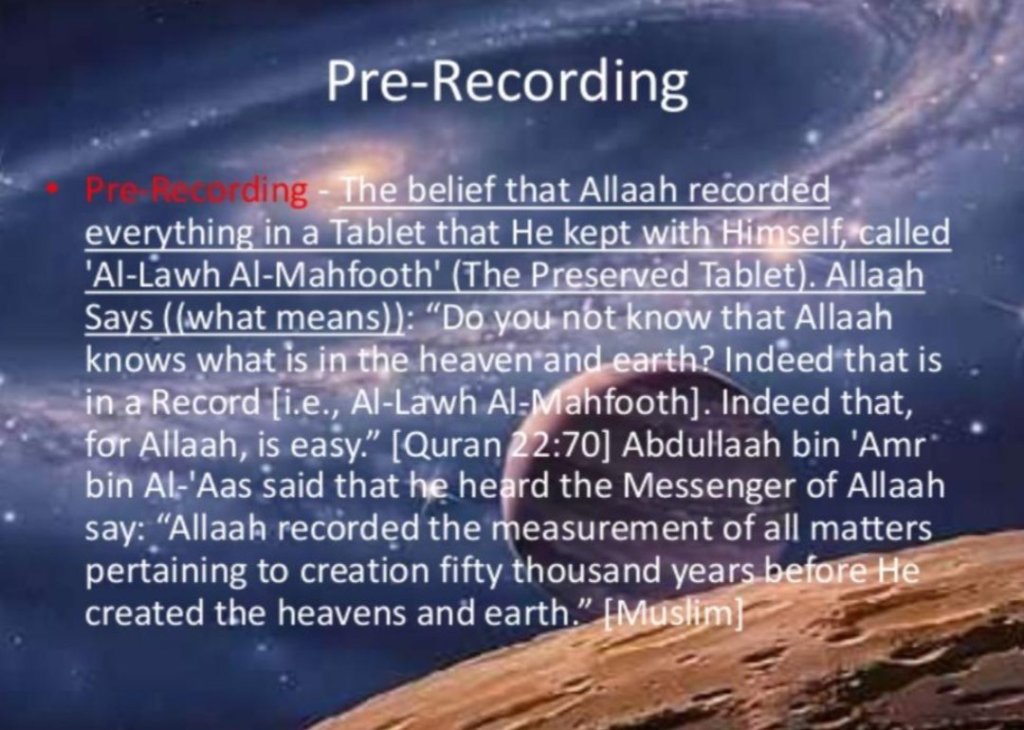
Surah Al-Burooj is a Meccan surah with twenty-two verses. Al-Burooj means The Constellations. The Surah is so designated after the word al-burooj appearing in the first verse.
The subject matter of this surah indicates that this was sent down at Makkah in the period when persecution of the Muslims was at its climax and the disbelievers of Makkah were trying their utmost by tyranny to turn away the new converts from Islam.
Its theme is to warn the disbelievers of the evil consequences of the persecution and tyranny that they were enforcing on the new Muslims, and to console the believers that If they remain firm and steadfast against tyranny and coercion, they will be rewarded richly for it, and Allah will certainly avenge Himself on the persecutors on their behalf.
It is certain that the disbelievers will not only be punished in Hell for their disbelief but more than that, they too will suffer punishment of fire as an equal recompense for their tyranny and cruelties they used to do in this world. Likewise, this is also certain that those who believe and follow up their belief with good deeds, should go to Paradise and this indeed is the supreme success. Allah threatens the disbelievers that they cannot escape His grip, and the Quran that they are belying openly, is unchangeable: it is inscribed in the Preserved Tablet, which cannot be corrupted in any way.
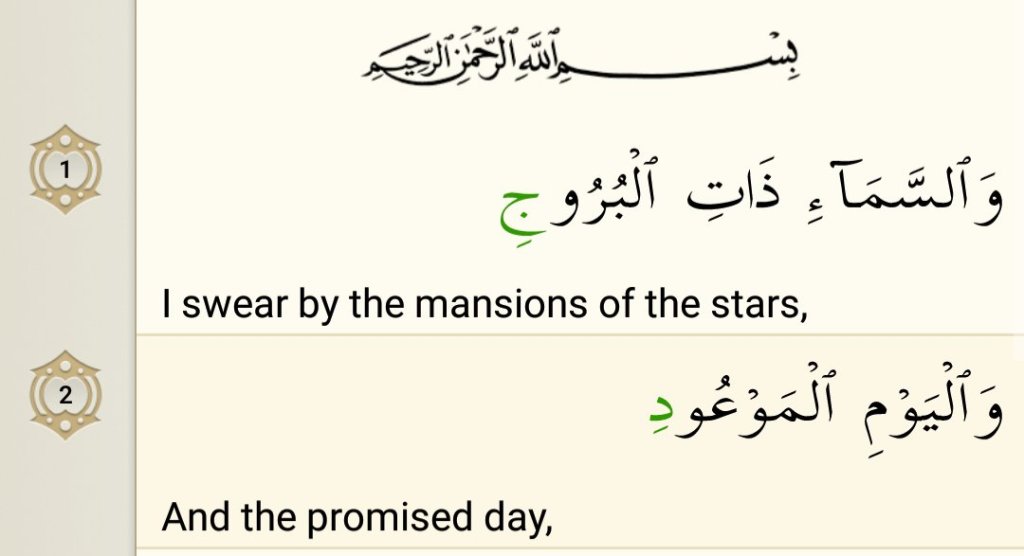
Allah first takes oath in the sky full of constellations. The term buruj is the plural form of burj which originally means ‘a castle’ or ‘a tower’. It is something apparent, manifest or conspicuous, high or elevated; hence burj is applied to a certain kind of structure. Also, burj is used to define an angle of a fortress, or of a surrounding wall of a city, which is more conspicuous; and sometimes a fortress, itself is called burj.
The celestial bodies are either the bright stars of the sky, or the constellations ( a number of fixed stars in the sky). Whichever of them the oath is made to, it denotes to its greatness which, perhaps, was not completely known to Arabs at that time, but it is much clear to us today. So Allah is referring to the bright large stars of the sky.
By using the word burooj we are told that the sky is full of forts and forts typically have solders within them. In this case, the soldiers are angels of Allah that are positioned in military posts all over the universe. Through the depiction of these large stars Allah is helping us visualise the forts full of angels that are stationed in the sky. A day is coming when they will be called to duty and leave these forts and come down from the sky in rows upon rows. That is the Day of Judgement in which Allah further takes oath.
Allah takes a second oath and swears by the promised day, the day that He has been promising over and over, the Day of Judgement. How these oaths are connected to the subject, will be revealed in upcoming verses.


The word shahid means to bear witness and also means to be present before something. Another meaning of shahid is to be a helper as the best helpers are those that you do not need to call or summon, as they are already available by your side. Thus, the one who witnesses something is called a shahid and whatever he witnessed is called mashood. So, Allah in this verse swears by the witness and by that which has been witnessed. These two words can be considered a summary of our whole Deen There are many commentaries given on the meaning of the terms shahid ‘witness’ and mashud ‘witnessed’.
1 – The Day of Resurrection
The Day of Judgement is a day to be witnessed and we are the witnesses. All the Surahs that describe the occurrences on the Day of Judgement such as the sky being torn up, the stars falling, the seas being set alight, the mountains moving away etc. are all mashood and things to be witnessed whilst we are the shahid – the witnesses.
2 – Creation of Allah
All the creations of Allah declare that there is no god but Allah. Every creation of Allah is shahid (a witness) and it is the testimony of faith – laa illaaha illAllah that is being witnessed.
3 – Ruins of old Nations
The Arabs would travel a lot and would often pass by the ruins of old nations and by passing by and observing this they become shahid to it and the ruins they observed were the mashood. The previous nations that rebelled and were destroyed are also shahid and the ruins are mashood. Alternatively, the ruins themselves can be considered a witness to Allah’s justice and the mashood is the power and justice of Allah.
4 – Allah is the Witness
Some of the salaf would say that Allah is Shahid and witnessing everything that we do and thus we are the mashood and the ones being watched by Allah.
5 – Our deeds
The angels that document the deeds of man and in doing so they are witnesses of what we do and whatever we do in terms of our actions is mashood.
6 – The Angels are witnessed
On the day of judgement we will see the angels descend in rows and we will be witnesses of them and they will become the witnessed and this is a reverse of the present roles described in point five.
7 – The Messenger of Allah
Allah’s Messenger is shahid (witness) to Jibreel (mashood) when he appeared on the clear horizon.
8 – Time is witness
In Surah Asr, time is shahid and bears witness that humans are in loss and born witness to the endless struggle of man from the point of his birth to his death and his ultimate loss.
9 – Our Bodies
The Quran states that our bodies will be a witness to its own actions in this life and then bear witness against itself on Judgement Day. Man’s ears, eyes, and his skin will testify against him as to what he used to do.
10 – The Messenger of Allah is a witness against his Own Ummah/Nation
Abdullah bin Masud said, “The Messenger of Allah said to me, Recite to me.’ I said,O Messenger of Allah! Should I recite (the Quran) to you, while it was revealed to you’ He said, Yes, for I like to hear it from other people.’ I recited Surah An-Nisa until I reached this Ayah, So how (will it be) when We bring from every nation a witness and we bring you, (O Muhammad) against these (people) as a witness?(An-Nisa 4:41)
He pbuh then said, ‘hasbuk’,Stop now.’ I found that his eyes were filled with tears.”
The Prophet pbuh is told that he has to be a witness against his ummah which saddened him to the point of tears. His testimony is of two kinds. The first is shafa’ah, which is his intercession for this ummah from the hellfire, and in the second the Prophet pbuh will say, My Lord, this nation of mine took hold of this Quran and then left it. These are two types of testimony and types of shahada of the Prophet pbuh and we and our actions and legacy are the mashood. So the Messenger of Allah will be a witness on that Final Day.
11 – This ummah is a witness
This ummah is also a witness and what will we be a witness to? We will be witnesses to the truth of Islam and to the truthfulness of the conveyance of the message from the Prophet pbuh.
12 – The Disbelievers bear witness against their own Disbelief
Throughout time the disbelievers testify against themselves with pride and through their disbelief.
13 – Allah is a witness to the completion of the conveyance of the Message of His final Prophet
In the final address to the Muslims on Hajj, the Prophet pbuh was nervous as he was aware that he was the last messenger and that there is no one else to follow after him. The ummah of every messenger ultimately ended up practising shirk and was thus followed by another messenger to guide people back to the straight path once more. However, there was no one to follow the final messenger and so his is stricken with grief and concern for his ummah when giving this address that they may go astray after him. Thus, he made sure that he covered himself when he pointed to the sky and said Allahuma ash-had (Oh Allah bear witness), and he repeated this, beseeching that Allah bears witness that he did his job.
14 – The Day of Friday and Arafah
In large the numbers the companions had an opinion that the day of Friday bears witness to our attendance and confirms our shahada. The day of Arafah happens once a year and just like Friday prayers can only be offered at the masjid, the day of Arafat can only be witnessed at Arafat. So, Friday is shahid and the Day of Arafat is mashood because it is not just a time but also a place. This is unlike the day of Friday which comes to you, but you have to go to and witness the Day of Arafah yourself during Hajj.
Thus, most of the above mentioned commentaries join and come under one category with a broad sense. All of them may gather in the meaning of the ‘witness’ and the ‘witnessed’ in a vast scope. This is one of the signs of the importance of the Quran whose meanings are so broad that many different commentaries can be applied to them. It is because sahid the ‘Witness’ concludes any witness and mashood the ‘Witnessed’ covers anything that can be witnessed. They are mentioned in ‘indefinite form’, which shows their importance which was explained, definitely, in the above commentaries.


Allah is now changing the subject. The Muslims of our Ummah are not the first to be tortured, oppressed, ridiculed or killed. Allah speaks of a people from the past. In this verse Allah is sending a curse on a particular group of people called the People of Ukhdood. The word ukhdood describes a rectangular shaped ditch in the earth that is dug and is quite deep and large. This verse is not just talking about the people of the ditch earlier in history but this crime of genocide, mass murders and mass graves is also happening today so this is not ancient history but an ancient practice, which Quran still adresses and makes it a hedious crime.
This verse refers to the companions of the ditch. A person is often remembered for a hideous crime they may have committed. For example, the name Nazi reminds the image of the Holocaust which in turn reminds one of their crimes. Thus, the people in this verse will be forever remembered by their crime. A parallel is drawn between the reality of this world and the next where the companions of the ditch will still be companions but this time in the HellFire. Allah says may the people of the ditch be destroyed not just for the ditch they have dug for the believers but for the ditch they have dug for themselves, not just the fire lit for the believers but for the fire they have lit for themselves. Allah is sending huge amount of curse on them!
There is a Hadith which narrates this story and in summary it speaks of a young boy who guided by another Muslim defied the ruler and his magician who had taught the boy magic and began to preach Deen and justice. Allah gave this boy many miracles (karamaat) to prove his truthfulness. One miracle that he had was that he couldn’t be killed by anyone, unless he was killed by uttering the words ‘In the Name of the Lord of the boy’. So the king gathered the people together to show this boys ending. The king said; ‘In the Name of the Lord of the Boy’ and then shot an arrow at him, killing him. The people were amazed at the sacrifice of this boy and what they had witnessed. The king who claimed to be a god called on ‘the Lord of the Boy’ to kill him acknowledging there was a greater authority than him. The people realizing that the king was a fake god and that the boy used to invite people to the worship of the one true god declared their faith in Allah. In doing so they went against what the king had expected as he assumed everyone would return to being subservient to him. The king became angry and so he and his men dug a ditch and threw all the believing men and women of the town into the trench and burnt them alive.
The Hadith mentioned here is connected to these verses for two reasons. Firstly, there is a narration where the Messenger pbuh narrated this Hadith and at the end of it he recited these verses. The second reason is due to the fact that the wording of the Hadith is similar to the wording in these verses _‘fa khada ukhdoodan’ (he had trenches dug), fa ja’ala yulqeehim fee tilqil ukhdood (then he started placing them in those ditches). Thus, it’s believed that the Hadith mentioned is related to the same events being described in surah Al-Burooj.
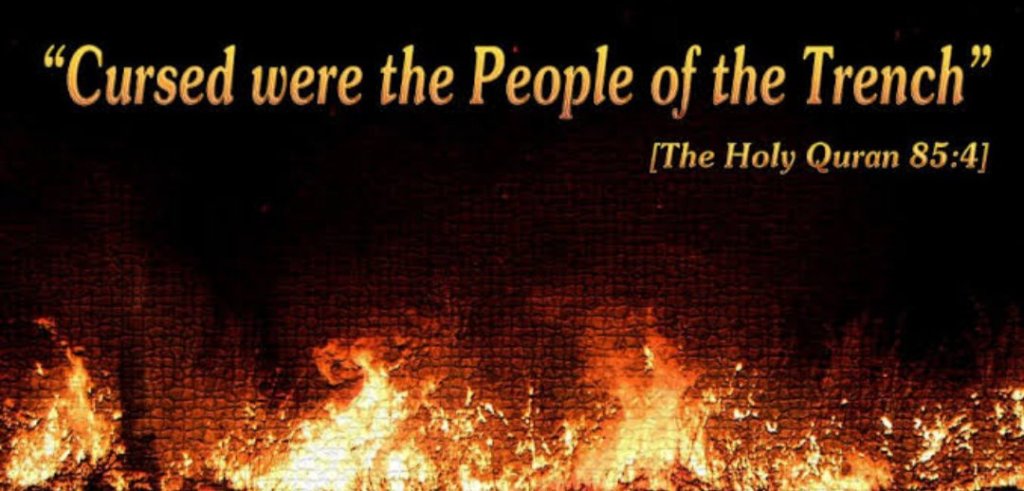
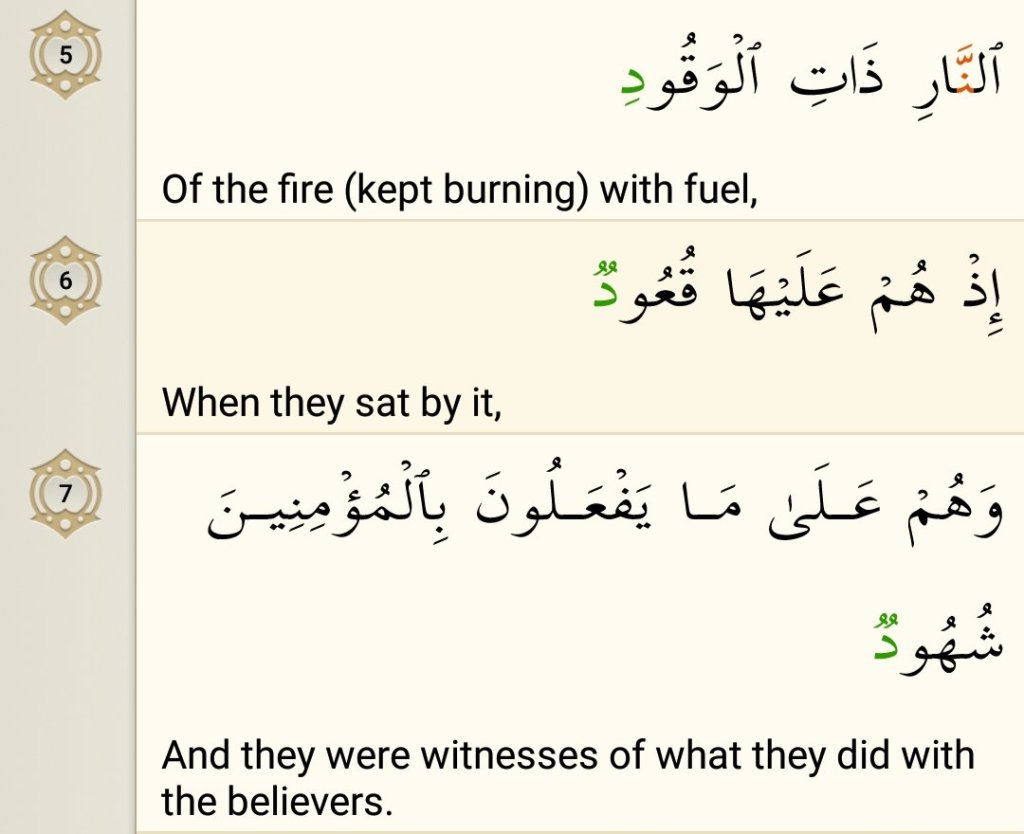
Allah then continues that these criminals have placed believers in a ditch filled with fire and it is the fire that is possessive of fuel, that used to excite flames. The word waqood means to kindle so the fire was kindled with fuel to keep the flames high. The same people who are destroying the believers in a ditch of fire, Allah will destroy them in the fire of Hell. They will become the fuel for that fire; thus, their crime of setting people alight with fuel will be their ultimate fate in the next life.
Quood means to sit for a long period of time. At the very brink of the ditch they would find themselves a seat and watch these people being forced into the fire and set alight. They were sitting and watching them burning not only indifferent, but also enjoying it. That was a sign of their utmost hard-heartedness. The pain they caused the believers pales in comparison to what Allah has planned for them.
These people did not even think twice about perpetrating their evil crime on the believers. They were especially aware of what they had done to the believers as they were present the whole time sitting and watching. So, Allah has made them the most thorough witness of their own crime and it needs the testimony of no one else, in this case Allah will make the criminals themselves testify. Shuhood is the plural of shahid and these disbelievers will bear witness against themselves and their crimes (the mashood).

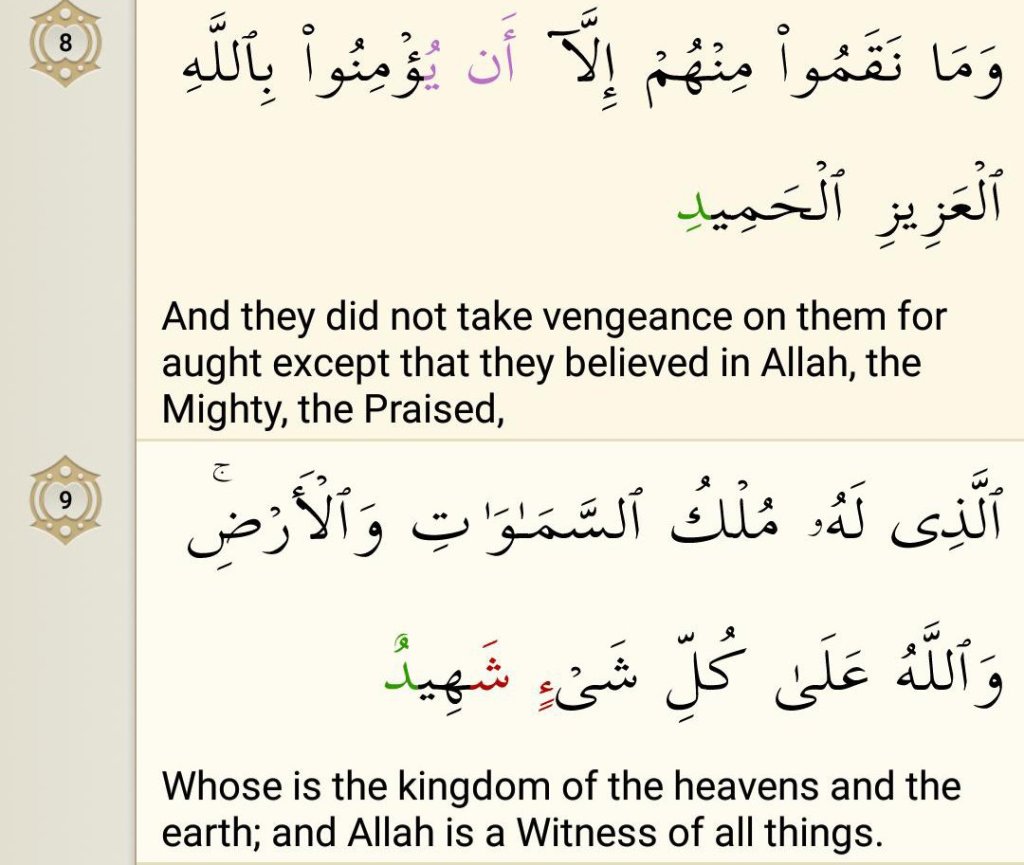
The subject continues that back in time these believers were killed brutally for no other reason but that they had believed in Allah. Allah Who is the All-Mighty the Self-Praiseworthy, Who is the Owner of the Kingdom of the heavens and the earth: and Allah is watching over everything. In these verses those of Allah’s attributes have been mentioned on account of which He alone deserves that one should believe in Him, and the people who feel displeased at one’s believing in Him, are wicked and unjust.
Verily, the believers had no fault, but that of their Faith in the True God, Allah. They believed in Allah, the Absolute Perfection, Who is Mighty, and is Worthy of all Praise. Was the belief in such a God a sin, or was the belief in powerless irrational gods? The term naqamu is derived from naqam which means ‘to devour, to dislike, to reject’ by tongue, or by practice through punishment and vengeance. Surely an action like that is done in great sin, not for the Belief in Allah, Who is exalted in Power and Worthy of all Praise. This makes it clear that how ignorant they were and how low their culture had been that they considered their greatest sin as their greatest pride.
The attributes of Allah mentioned here, The Mighty and The Praiseworthy are indeed, a reply to their iniquities and a proof against them. Meanwhile, they are also a threat and warning to all the doers of persecution, throughout history, that Allah the ‘Almighty’, and the ‘Praiseworthy’, keeps watch over them.
To Allah belongs the dominion of the heavens and the earth. And Allah is Witness over everything. It is a glad tiding to the believers that Allah is attentive and watchful over their perseverance and patience in defending Faith, and He sees their sacrifices and devotions. These are the facts that give them power and satisfaction.
On the other hand, there are threats and warnings for their enemies to know that Allah is Mighty but, He leaves them alone in order to examine them and, at last, they will receive the painful chastisement for their evil deeds.

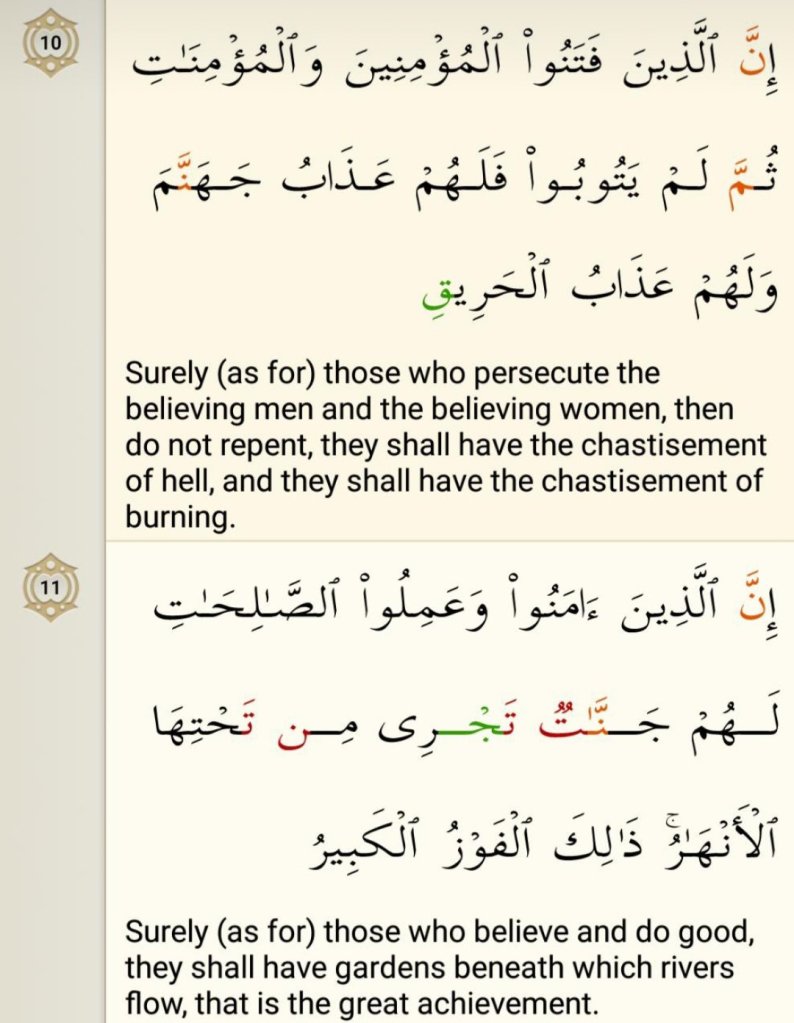
Allah’s Punishment for the Persecutors
After describing, in the former verses, the terrible persecutions carried out by some past generations who burnt the resisting believers, in the these verses it points to the grievous punishment of Allah, for them, in contrast with the great rewards for the believers. The warning is quite clear that those who persecute or draw into temptation believing men and believing women, yet repent not, for them is the punishment of Hell and for them is the punishment of the Burning Fire.
The term fatanu here means ‘to try or prove’ (as gold in the fire to ascertain its purity), then the term is used in the sense of examination and persecution (by burning) or both. It is also used with the meaning of either punishment or leading into temptation.
The words ‘yet they repent not’ in the verse, shows that it is possible for the persecutors to repent, and this signifies the highest Mercy of Allah to the sinners. In the meantime, it warns the pagans of Mecca to leave off with the persecuting of the believers and return to the way of Allah before it is too late. In principal, the Quran does not close the door of repentance on anyone. Then, it can be understood that the settlement of the painful punishments are for the improvement of the sinners and returning them to the way of Allah as a consequence.
It is noteworthy that there are two kinds of distinguishing chastisements, mentioned in the verse for the persecutors. The first is ‘the punishment of Hell’, and the second is ‘the punishment of the Blazing Fire’.
The case is, perhaps, for the reason that there are many kinds of punishment in Hell, one of which is ‘the Blazing Fire’ and it is especially mentioned for those evil persecutors that should be punished with Fire on That Day. But, how different these two kinds of fire are!
Then, paying attention to the rewards of the Righteous, it says that surely those who believe and do good deeds, for them are Gardens underneath which rivers flow, that is the great salvation, the fulfillment of all desires. What a great Salvation! What can be better or higher than being the Nearest to Allah, honourably, in the midst of the Gardens of Bliss, the Etemal blessings? But, it should be noted that the essential means of obtaining this ‘great Salvation’ is ‘Belief and doing good deeds’.
The phrase ‘amal-us-salihat’ means doing good-deeds denotes that a mere good action, or a few of them done temporarily, are not enough, but good deeds must be done continuously by the believers.

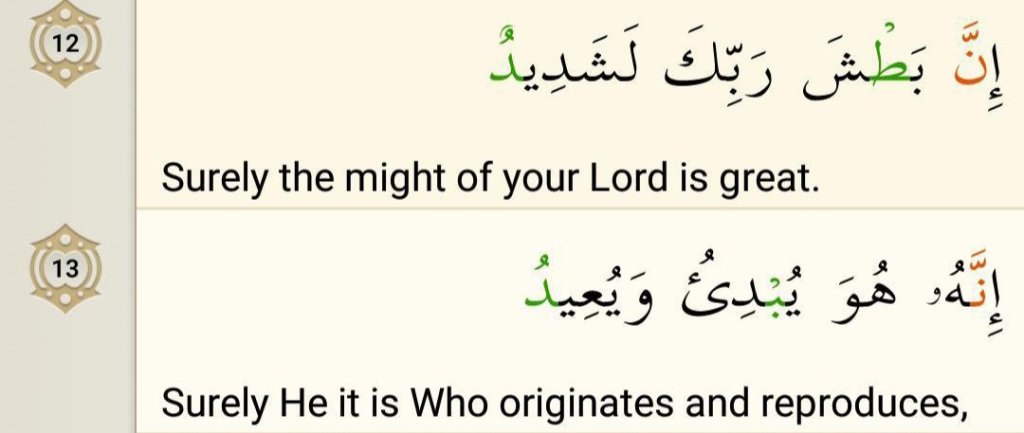
Allah informed us in previous verses that the believers who were oppressed will get justice and instructs those who continue to believe even though they are oppressed to focus on their reward of a beautiful Jannah with flowing rivers. Even though the Prophey pbuh who is the leader of this Ummah is aware that the ultimate reward of his followers who are being tortured and oppressed is Jannah, still he is concerned and feels deeply for the believers. So, Allah turns away from the discourse of believers and disbelievers and turns to the Prophet pbuh and gives him counsel.
The word battsha means to seize and grip someone who is weaker than you and who is unable to break free and then to continue squeezing them tighter. The word shadeed comes from shidda which means to tie something up, to knot it over and over and then to finally pull it forcefully to tighten it. Allah informs the Prophet pbuh that the seizing of his Master is extremely tight and intense and that He is extremely powerful when it comes to punishing the oppressors. Thus, the disbeliever in his state of authority and power would seize the believers and physically harm them but the Prophet pbuh is told to visualise the gripping and seizure of his Master (rabbi-ka) who is watching and has the power to exact revenge even now if He wants.
Then it is said that surely it is Allah Who begins and repeats the creation. Allah strongly emphasises that ‘He’ will bring back to life the believers and the disbelievers. It was Allah who brought the believers into this world the first time round and the disbelievers are mistaken in thinking that the believers will just die. The kuffar who think they have free rein on this world will also be brought back. Thus, the One who originated everyone will repeat the creation and bring all back to life on Judgement Day for final accountability.
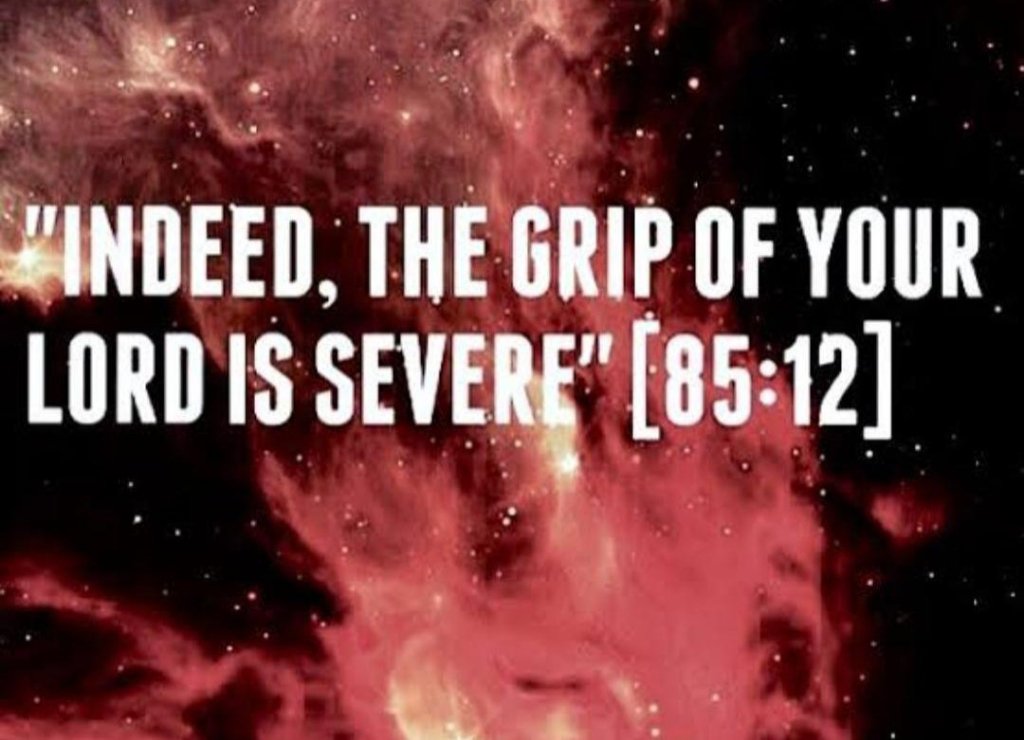
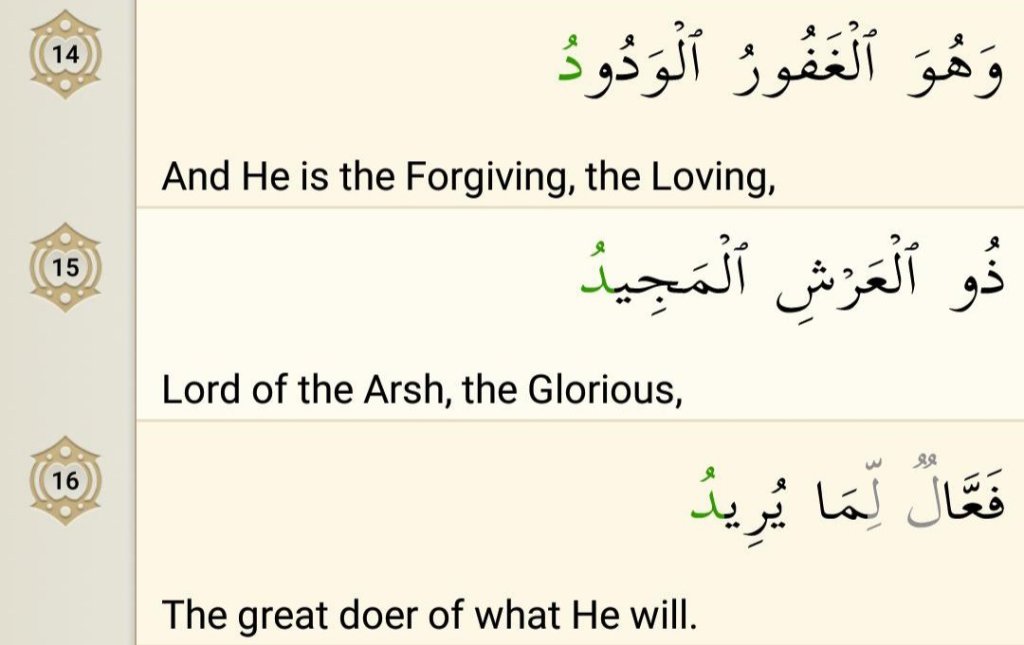
Now the five qualities of the divine attributes are mentioned that Allah is,
1.All-forgiving,
2.All-loving,
3.Lord of the Throne,
4.The Glorious,
5.The Doer of whatever He wills.
The terms Al-Ghafoor (All-forgiving), and Al-Wadud (All-loving) both are of the utmost amplification which refer to the extreme forgiveness and love of Allah. He is ‘forgiving’ of the sins of those sinners who repent, and is ‘Loving’ to the servants who are good-doers.
In fact, these divine attributes are mentioned to be added to the threats given in the former verses to illustrate the fact that the sinners can repent and be forgiven because, while Allah is strict in punishment, He is All-forgiving and All-loving.
The third attribute is ‘Lord of the Throne (Arsh). Allah is the Lord of the ‘Royal throne’, and He has all the Power and Sovereignty. This touches on the fact that the rulership of all creatures is His, and Allah’s Will is, itself, the Word and the Deed. There is no interval between them. No circumstance whatever can come between His Will and the execution thereof. Therefore, it is quite easy for Him to call the dead to life, again, and punish the persecutors and the oppressors.
The term Al-Majeed means ‘to excel in glory’ which is used only for Allah. The association of these five Divine attributes are clear, because Allah is All-forgiving and All-loving under the absolute Power (Omnipotence), Graciousness and with His Will so that nothing can stop Him, no one is able to confront Him, nor does His Will fade. Whatever He wills, it happens!
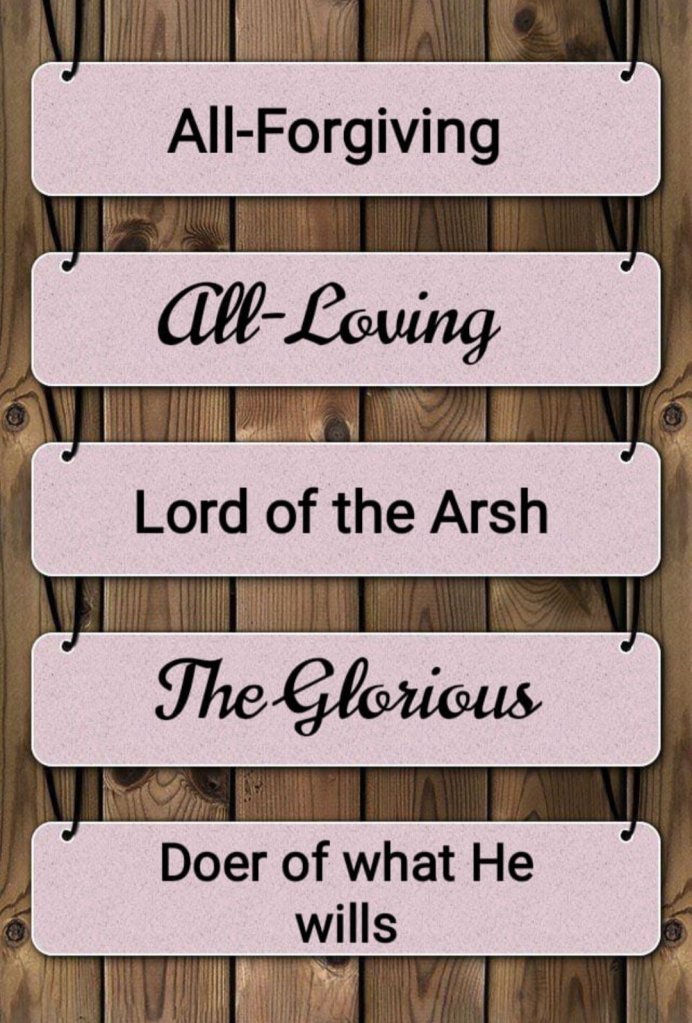
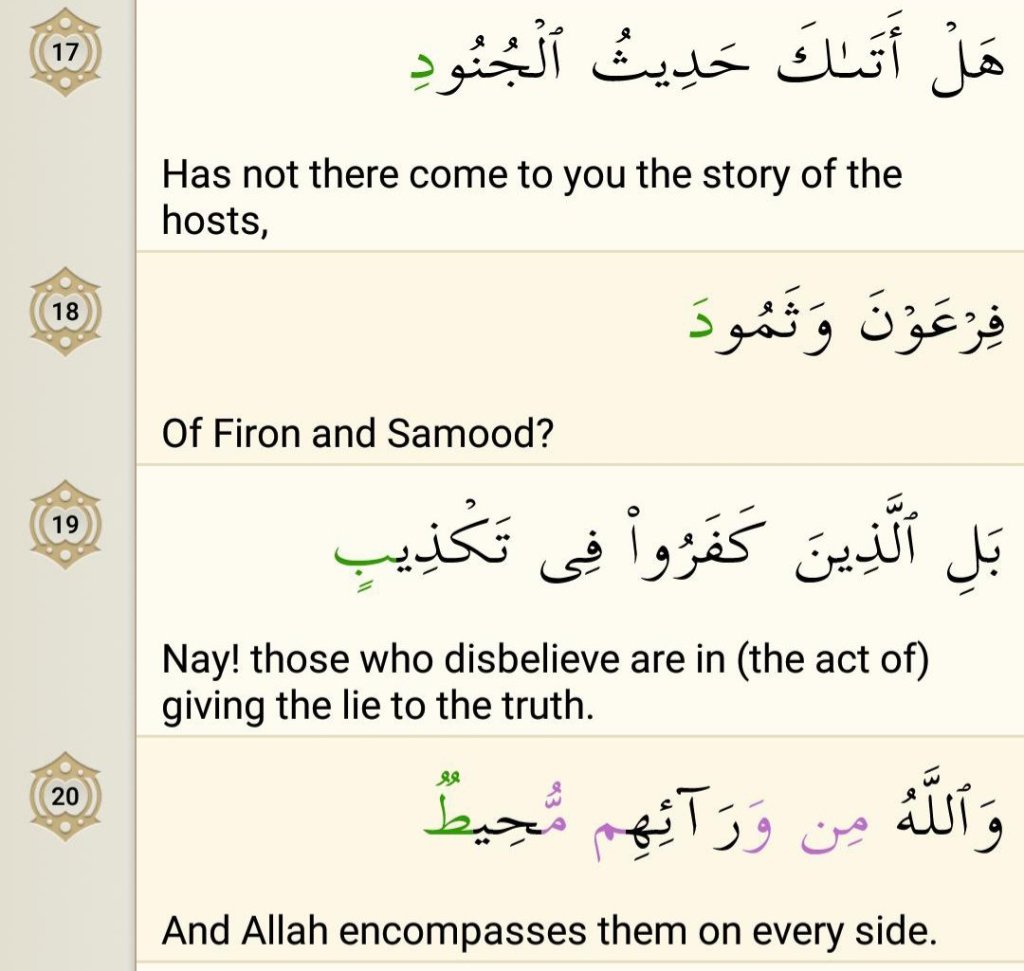
Did You See What Happened to the Forces of Pharaoh and the Tribe of Thamud?
The previous verses were about the Absolute Power of Allah and His Sovereignty with some threats for the unbelieving persecutors. Then, to make it clear that these threats are not a mere statement and they are practicable, in the next verses it addresses the Prophet pbuh and says that has the story reached you, of the Forces.
These forces are some large and great troops which fought against Allah’s prophets in the past, but all of them perished.
Then two examples of the forces are mentioned: one of them is very ancient, and the other waa not so ancient then, of Pharaoh and the tribe of Thamud.
These peoples were those who governed throughout of the world at their time from east to west. Some of them exploited the stable stone of the mountains and built splendid houses and castles with them, so that there were no other people who could match them, in those times.
But Allah destroyed them all. Pharaoh was a proud monarch of a powerful kingdom, with resources and organization, material, moral, and intellectual, as good as any in the world. When he pitted himself against Allah’s Prophet, he and his forces were destroyed through water in the Nile.
The ‘Thamud’, a very old generation, were great builders, and had a high standard of material civilization. But, they defied the law of Allah and perished in a dreadful earthquake and cold terrible storms, which threw them prone on the ground and buried them with their fine buildings. These two factors, water and wind, were of the main necessities of life, but they worked as the means of their inevitable destruction.
Pharaoh and Thamud are two examples who were both very powerful; chosen from all past arrogant generations. They are selected because the Arab pagans knew their names and were partly familiar with their history.
Then Allah says that yet the unbelievers persist in rejecting the Truth, just as the Quraish were doing in frontline.
Truth is obvious to all, but the arrogant ones do not follow the ‘Way’ and do not obey the ‘Right’. But they should know that Allah encompasses them from every point and they are all always within His grasp. If Allah leaves them alone for a while, it is not due to inability, and if He does not punish them immediately, it is not because they are out of His reach. They cannot escape from divine Justice and Penalty.

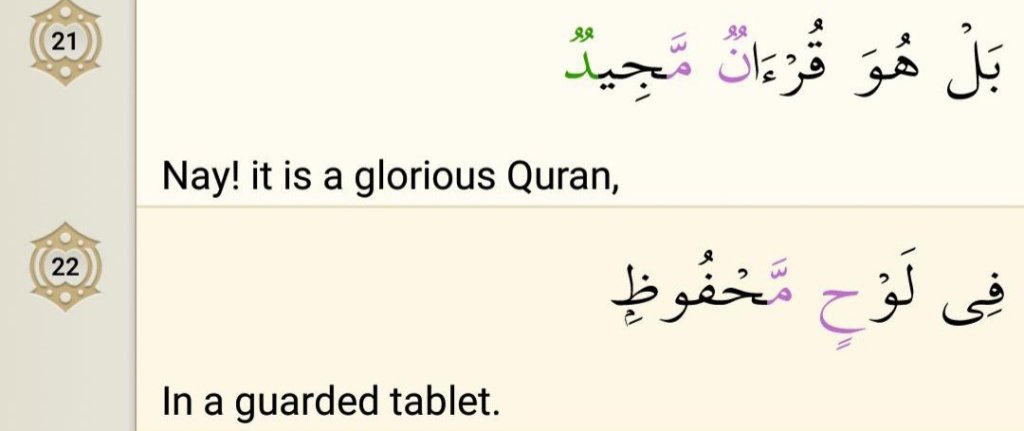
Now pointing to the vanity of the disbelievers persistence in rejecting the Quran and their claim that it was magic, or poetry Allah says that this is a glorious Quran which is Inscribed in a Preserved Tablet!
It will remain safe and unchanged from the hands of the Wicked, the Satans, and the Soothsayers. Therefore, O Prophet pbuh! Pay no attention if they call you a poet, or sorcerer, or soothsayer, or even mad. Do not be worried. Your support is Allah Al-Mighty and your Way is clear.
As it was mentioned before, the term majeed means ‘to excel in glory’ and is completely appropriate for the Quran, because its contents are broad and glorious and its meaning is vast and exalted both about Divine theology, and ethical morals, as well as religious laws.
Hence, the Preserved Tablet is the very Knowledge of Allah, which encompasses all the world and is safe from any distortion and alteration.
Surely, the Quran originates from the endless knowledge of Allah, and is neither from man’s thought, nor a production from the Satans. Its content, itself, proves this fact.
This is probably the same thing that the Quran has called kitab-un-mubin‘a Record Clear’ and sometimes Umm-ul-Kitab ‘the Mother of the Book’!
